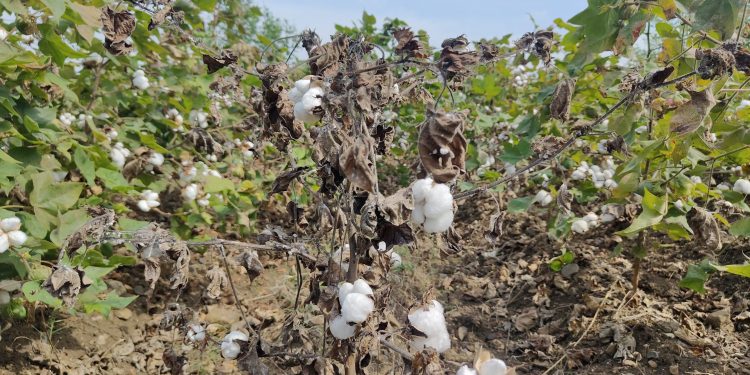Bhawanipatna: Inclement weather along with bouts of untimely rainfall has put the cotton farmers in Kalahandi district on their toes, leaving them sceptical about getting the right price for their produce in mandis. Known for its long fibre and durable quality, cotton is a hallmark crop of Kalahandi district.
However, this year’s erratic rainfall combined with unfavourable weather conditions has cast doubts on farmers’ prospect of receiving fair prices for their cotton in the mandis. Reports indicate that over 50,000 farmers have registered for cotton cultivation this season. The Agriculture department estimates that cotton has been planted on 71,000 hectares in Kalahandi, with production projected to exceed 1.071 million quintals.
Despite the optimistic projection, concerns persist about the government’s effort to ensure successful implementation of cotton farming initiatives. According to data available from the Cotton Scheme Officer, only 2,121 farmers have sold around 63,000 quintals of cotton so far this year, reflecting significant underperformance. In previous years, cotton cultivation in the region matched the record-breaking scale of paddy farming.
This year, however, farmers are anxious about sale of their produce. While the Minimum Support Price (MSP) for cotton is set at Rs 7,521 per quintal, many farmers have been forced to sell their produce to middlemen at lower prices, avoiding reliance on the mandi system. This has given rise to distress sale of the fi bre in the district. The Rayagada branch of Cotton Corporation of India Ltd. has reported that Gopal Organic and Dadaguru Agro India Pvt. Ltd. procured cotton from the Karlapada centre. On the other hand, companies like Natural Organic, Savitri Cotton India, and Bansal Agrotech have made purchases from the Kesinga centre.
Also Read: Villagers tie up 3 to trees over ‘conversion’ bid
However, the farmers are hesitant to sell their produce in mandis this year despite the facilities being operational since November 29. It is crucial for the administration to understand this hesitation. Reports said that middlemen intercept farmers at their doorsteps and offer to buy cotton for `6,500 per quintal even before it reaches the mandi. Additionally, there is no measure in place to stop the illegal transportation of cotton from the district, as government gate systems are no longer operational. Cotton cultivated on Kalahandi’s black soil has high demand not only in international markets but also in states like Maharashtra and Gujarat. In fact, Kalahandi farmers have successfully exported cotton to countries like Thailand and Bangladesh earlier. Chatters are abuzz that the District Collector is directly monitoring the opening of mandis this year but the volume of cotton arriving at the mandi remains unsatisfactory.
This year, mandis have been opened in areas like Karlapada under Bhawanipatna block, Utkela under Kesinga block, and Uchala under Golamunda block. Depending on the quality, cotton with 8-11 per cent impurity levels is eligible to be sold at the MSP fixed by the government. Farmers are sceptical about receiving a fair price given the biting cold prevailing in the region. They have failed in properly drying their cotton bundles and transporting the harvest to the mandis in this weather condition. Many are waiting for outside traders to arrive and offer better deals. On the other hand, middlemen and agents from neighbouring districts and Andhra Pradesh are allegedly luring the farmers to sell their produce illegally. Reports suggest that 8 to 10 locations in the district see illegal trading of up to 2 lakh quintals of cotton annually. Despite this, the administration is yet to take any steps to curb such practices.






































